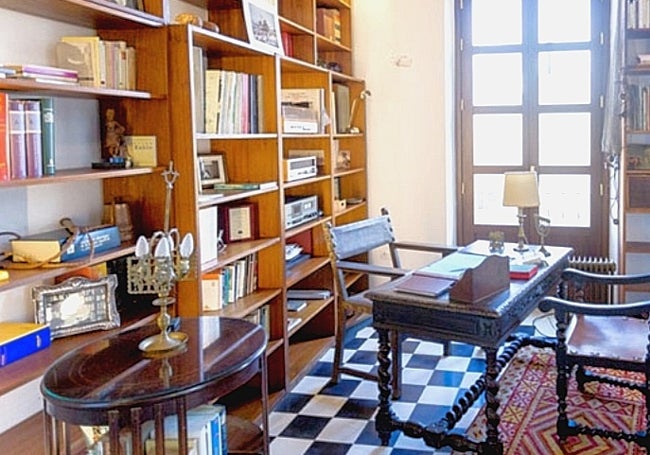World Poetry Day 2024: Spanish poets in times of resistance
The lives of Joseph Blanco White and José Ángel Valente were linked to both Andalucía and England. As well as writing poetry, the former fought against French invaders and for the independence of Spanish America, while the latter did so against Franco's dictatorship
Alekk M. Saanders
Thursday, 21 March 2024, 13:30
For the past 25 years the world has celebrated a day dedicated to poetry, to encourage the writing, reading, publishing and teaching of this art around the world. Unesco established World Poetry Day in 1999 to give new recognition and impetus to national, regional and international poetry movements.
Joseph Blanco White
Joseph Blanco White was born on 11 July 1775 in Seville as José María Blanco y Crespo. He was the son of William White, an Irishman from Waterford who emigrated to Seville in the early 18th century to take over his uncle's trading house, and who became known as Guillermo Blanco. Supposedly to facilitate his business dealings with American colonies, he changed his surname to Blanco. His mother was María Gertrudis Crespo y Neve, who came from a noble Spanish family, though of modest wealth.
Blanco White was educated for the Roman Catholic priesthood. In time, however, he became a freethinker, largely due to his collaboration with Melchor de Jovellanos, a major figure of the Spanish Enlightenment. In 1808, he began his journalistic career as a defender of Spanish independence during the French invasion of Spain. When the French entered Seville in 1810, he fled to England.
Joseph White studied theology at Oxford. It is reported that there he converted to Anglicanism and re-anglicised his name - from Blanco
In London, Blanco White is said to have been kindly received by several Englishmen, including Lord Holland, a important politician at the time. He soon established the periodical El Español (The Spaniard), which was circulated in Spain to incite Spanish opposition to the French and which was also strongly for the independence of Spanish America.
In England Joseph White became known as a writer of essays, poems and popular polemical treatises on questions of dogma
Joseph White studied theology at Oxford. It is reported that there he converted to Anglicanism and re-anglicised his name – from Blanco. While at University, he struck up friendships with young clerical intellectuals who subsequently became leaders of the Oxford Movement. Later, Joseph White was appointed as editor of a new quarterly journal, The London Review.
In England Joseph White became known as a writer of essays, poems, and popular polemical treatises on questions of dogma. He is best remembered for his sonnet Night and Death, dedicated to Samuel Taylor Coleridge.
Blanco White died in Liverpool on 20 May 1841. The correspondence, manuscripts, notebooks and pamphlets relating to his life and work form the Blanco White Collection, held in the library at the University of Liverpool.
José Ángel Valente
A Spanish poet of 50s, José Ángel Valente was born in Galicia on 25 April 1929. He studied law at the University of Santiago de Compostela and then graduated from the University of Madrid with a degree in Romance Philology. In the mid-1950s he went to England and was a lecturer in Spanish philology at Oxford, where he also earned his Master of Arts. He translated for the World Health Organisation in Switzerland, before moving to Paris, where he worked for Unesco.
In 1972, José Ángel Valente was accused by Franco's government of insulting the honour of the Spanish army. Consequently, he was only allowed to return to Spain after the death of the Spanish dictator, finally settling in Andalucía, where he lived and wrote. It is thought that Almería attracted the poet due to its desert landscapes and the nearby Cabo de Gata National Park. Valente died in 2000.
Almería attracted José Ángel Valente, due to its desert landscapes and the nearby Cabo de Gata National Park
An obituary to José Angel Valente by The Guardian wrote, "Many of those who grew up under Franco became politicised poets, but Valente turned to writing meta-poetry about the inner processes of poetry itself because he was a "poet in times of misery" who had to re-think what poetry meant in the corruption of language under Franco. The practice of writing and translating poetry became his self-defence, and path to the enigma of inner knowledge. Franco's shadow drove him into 'poverty and exile', living in what he called the 'extrapatria', outside Spain."
José Ángel Valente was named Spain's most dedicated poet, described as "a poet's poet elaborating an austere ethic of creativity"
José Ángel Valente is considered one of the greatest Spanish poets of the latter half of the 20th century. He was named Spain's most dedicated poet, described as "a poet's poet elaborating an austere ethic of creativity". For his work, he was the prize winner of the Pablo Iglesias Posse Foundation (1984), Princess of Asturias Awards (1988), and Queen Sofia (1998). The Department of Poetics and Aesthetics at the University of Santiago de Compostela was named after him.
A day out in Almería
In Almería you can visit La Casa del Poeta (The Poet's House), located on the street that bears his name. The renovation project of José Ángel Valente's house was carried out with the aim of spreading his poetry and turning his home into a centre of pilgrimage for literature. Casa del Poeta, with its different spaces and thematic areas, attempts to take visitors on a journey through the life and work of José Ángel Valente.

Zoom

It is thought that José Ángel Valente saw his home Almería as a magical path, connecting basement and roof; an ascent to the light that also influenced his own creative process.
-RCnUnse9qR9gKEJYfHBZo6O-1200x840@Diario%20Sur.jpg)